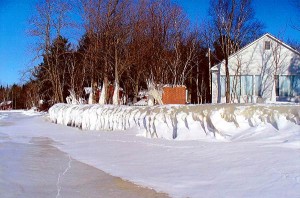
The Maine Congress Of Lake Associations annual meeting happens at Colby College this year in the Pine Tree State.
June 26th in the Diamond Building of Colby College is the meeting place for such topics as Exploring the History of the Belgrade Lakes Region, Maine Lake Dynamics: Long Trm Studies, Climate Change and Lake Basin Characteristics and Loons, Other Birds as Indicators of Environmental Health. These topics and more coverered at the Maine COLA meeting at Colby later this month.
Earlier in the MeInMaine blog we covered the do’s and don’ts in the Maine Shoreland Zoning around lakes, ponds, rivers, ocean front real estate. And when people think Maine, clean water is part of that image of Vacationland along with lighthouses, lobsters, potatoes, blueberries and Mt Katahdin. But if the health of Maine’s waterfront is not protected thru education of what hurts it, what the pressures are before this resource is gone, then Maine’s pristine crystal clean waterways won’t be held in such high esteem.
Being a good steward of a Maine lake property, something on a pond, stream, river or ocean is something locals realize. Giving the property to your family in better shape than you got it is easier said than done now though. Outside forces like clear cutting a strip of woodland on an incline where the water from rain, snow run off can suddenly race to the lake, dump in to that river, stream or pond is dangerous and not an easy fix. Especially if other watershed over cutting, improperly built roadways are being inserted on the local landscape without proper supervision.
Meanwhile, I get asked lots of questions from Maine waterfront real estate buyers like if I buy a “seasonal” camp, want to convert it to a permanent, year round home..what is the process in the ME shoreland zone. You can if you can obtain a seasonal conversion permit from the local Maine Plumbing Inspector if it can not be shown the place was used year round from a set schedules of dates, times in the past.
No one wants to hurt the lake and to make sure the existing septic system of that lakefront property can handle, is adequate for the extra pressure of year round subsurface wastewater disposal.
. Because you want it to work, and you may need to improve an antiquated, outdated under designed septic system too primitive for your year round use and lake resource protection.
Another question on empty vacant Maine shoreland lots, or land on a lake, river, pond, stream or ocean front comes up often too when no structure is on the that waterfront land concerning clearing vegatation, cutting trees.
I tell waterfront real estate buyers there is a 100 foot buffer zone with specific clearing rules like no more than 40% of the total volume of trees over 4 inches in diameter may be harvested in any 10 year period.
Vegetation less than 3 feet in height, including ground cover, cannot be removed. And pruning the lower 1/3 of tree branches within the buffer is permitted. Some water bodies have a buffer zone of 75 feet, clearing is limited to 40% of volume in a 10 year period, no cleared openings, no opening within the forest canopy can exceed 250 square feet.
It is best to put in a winding foot path to that lake frontage, not a straight down a hill slice of vegetation where erosion can race, dump in to that water frontage you are toying with purchasing too. That meandering path is allowed, its width depending on the body of water. Selective cutting, clearing beyond the buffer zones and timber harvesting is also regulated so always a good idea to make your Maine waterfront land purchase contingent upon local approval. And don’t just rely on the state regulations from the DEP, LURC either. Local Maine towns, cities may haver beefed up, beyond the state standards and strong lake associations like Maine COLA to add more protections, further restrictions for the privledge to be on a Maine lake, pond, river, oceanfront.
I’m Maine Real Estate Broker, ME REALTOR Andrew Mooers
207.532.6573
info@mooersrealty.com
